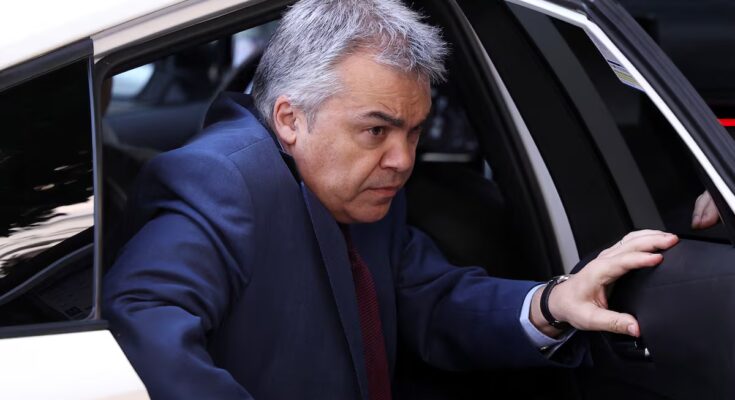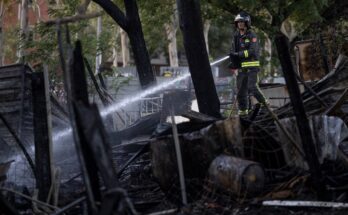On May 23, 2017, just two days after Pedro Sánchez won the PSOE primaries and regained the position of general secretary of the party, Santos Cerdán, a key player in that campaign, had dinner at the La Paloma restaurant in Madrid, with entrepreneur and friend Joseba Antxon Alonso and the then director of Acciona Construcciones Justo Vicente Pelegrini. The meeting had been organized by Alonso and Vicente Pelegrini had taken care of the booking. The supposed objective of the meeting was to pave the way for the launch of the so-called project Mina Muga, the opening of a potash operation in Sangüesa (Navarre) which had encountered several administrative obstacles.
Just six days after the dinner, Acciona Construction signed a contract with the company Servinabar 2000 SLU in which the large construction company committed to paying the latter 2.8 million euros for the drafting of the project’s safety plan. Servinabar was a Pamplona-based company created in 2015 in which the former Navarre socialist leader owned, as of June 2016, 1,350 shares (45% of the existing 3,000). The mining project, which encountered strong social opposition, finally obtained the favorable environmental impact statement (DIA) two years later, in May 2019, when the PSOE was already in government and José Luis Ábalos, in the Ministry of Development.
The latest report from the Central Operational Unit (UCO) of the Civil Guard sent recently to the judge of the Supreme Court, Leopoldo Puente, who is investigating the alleged corruption conspiracy that lurked in the Ministry of Public Works during the Ábalos period and in which Cerdán and the former councilor Koldo García are also accused, marks this meeting as the first in which the former Navarre socialist leader, then a member of the provincial parliament, was openly involved in the efforts. of the alleged conspiracy.
The researchers point out that, in reality, Mina Muga was “the first joint project between Acciona Construction and Servinabar, being, therefore, the origin of the relationships between the two companies” and place it in what they defined in their reports as the “pre-ministerial phase” of the corruption conspiracy, before Ábalos’s arrival at the ministry. From the police document it appears that the role of both the Navarre company and Alonso y Cerdán “would have consisted mainly of acting as a link between the management of Acciona and Geoalcali (another company that participated in Mina Muga) on the one hand, and the Public Administration on the other”.
Indeed, the UCO report highlights that the “participation” of the former PSOE leader was not limited to lunch with the then Acciona Construcciones manager Vicente Pelegrini (recently accused by Judge Puente) or to sending WhatsApp messages to his alleged partner to ask him for information on the progress of the negotiations, but extended to “intermediation with other public officials to achieve various objectives”. Among these, there are alleged contacts with the leaders of his party in Aragon and, in particular, with the then president of the autonomous government of the region, the socialist Javier Lambán – who died last August – according to a handwritten document of which an image appeared on a hard drive seized from Koldo García.
According to the researchers, the objective of these contacts was to obtain that the municipality of Remolinos, a town in Zaragoza with just over 1,000 inhabitants, authorized the use of some old mines existing in the municipality to deposit the saline waste generated by the Mina Muga project. On 8 May 2018 the City Council of this Municipality granted authorization to this effect. In this sense, and as a sign of the “particular interest shown by Koldo (García) and Santos (Cerdán)” in the mining project, the Guardia Civil highlights the image of another handwritten document found among the IT equipment of Ábalos’ former advisor linked to this management in Aragon.
This contains the identities of several officials of the General Directorate of Energy and Mining of the Government of this regional government, which includes notes on “their possible predisposition or opposition” to the interests of the suspects. Thus, on one it is emphasized that “his position is ok”, on another it is highlighted that he is “contaminated by a management suspicious of everything” and, on one, his political positioning is even alluded to. “We can!!! Bad people.” The investigation also identified the sending of emails in 2016 by the Basque businessman to the then president of the Navarre government, Uxue Barcos.
However, the UCO report highlights that, “beyond the regional contacts maintained directly by Antxon (Alonso) or indirectly through Koldo (García) and Santos (Cerdán), the future of Mina Muga was subject to the favorable EIA to be issued by the Ministry of the Environment.” In this sense, the agents underline that this document would not have finally arrived before May 31, 2019, “a time when Ábalos was already part of the government”. This temporal coincidence is considered by the Civil Guard to be of “particular relevance” since, according to the agents, it “highlights the role played” by both Cerdán and the Basque entrepreneur, as well as “the added value they could have brought to Acciona Costruzioni through their relationships with Public Administration officials”.



